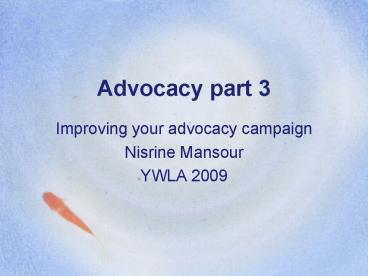Advocacy part 3 - PowerPoint PPT Presentation
1 / 24
Title:
Advocacy part 3
Description:
Ethical issues in advocacy for social issues and humanitarian ... need to put a plan of action for protecting and publicising abuse. Monitoring and evaluation 1 ... – PowerPoint PPT presentation
Number of Views:52
Avg rating:3.0/5.0
Title: Advocacy part 3
1
Advocacy part 3
- Improving your advocacy campaign
- Nisrine Mansour
- YWLA 2009
2
Session Objectives
- Ethical issues of advocacy
- Accountability in advocacy campaigns
- Managing finances in advocacy campaigns
- Managing advocacy human resources
- Monitoring, evaluation, learning
3
Why are accountability and ethics important?
- Legitimacy at stake
- Representativeness claims
- Long term vs. short term goals better met through
accountable behaviour - To prevent doing harm
4
Ethical issues in advocacy for social issues and
humanitarian relief
- Doing Good or Do No Harm?
- Parts v. whole
- Collaboration and cooperation
- Funding
- Campaigners safety and wellbeing
5
Accountability definitions
- Accountability is about the obligations to give
account for performance rendered - Four dimensions of accountability (Kumar 1996)
- Fiscal/financial accountability demonstrating
money has been spent where it was supposed to be
spent - Legal accountability actions are within the
laws of the state where programme is implemented - Programme accountability effectiveness of the
programme in achieving objectives - Process accountability efficiency and process
of implementation
6
Multiple accountabilities
trustees
government
donors
Upwards
Advocacy campaign
Downwards
supporters
partners
Staff/ volunteers
Concerned populations
7
Accountability to Donors
- Fiscal Accountability
- To spend money for designated purposes
- Account monies spent
- Programme Accountability
- Demonstrate effectiveness and impact
8
Accountability to the State
- Legal accountability
- Are the advocacy activities within the legal
framework? Can they always be? How to counter
this challenge? - Fiscal accountability
- Are any applicable taxes paid accordingly?
- Programme accountability
- How does it fit/clash with the larger planning
goals and policies of the state?
9
Accountability to own organisation/group
- Programme accountability
- Are campaign objectives being met?
- Promoting self evaluation and learning
- Process accountability
- Is the process appropriate to the groups
resources and capabilities? - Is learning occurring?
- Is archiving occurring? - organisational and
institutional memory
10
Accountability to the concerned populations
- Do advocacy actors have accountability to the
concerned populations on all levels fiscal,
legal, programme and process? - How can vulnerable populations hold advocates
accountable? - Children
- Disabled
- IDP/Refugees
- If not, who can? Donors? The media? the state??
11
Representation of the concerned populations
- Ethics of using images of starving poor, women as
victims etc. - e.g. Pornography of poverty
(Plewes and Stuart) - Populations are portrayed as helpless victims and
dependent at times reinforce racist stereotypes - E.g. Save the Childrens switch to using of
positive images smiling children, village pump,
etc.
12
Accountability and Funding
- Funding, integrity, and reputation
- Should certain sources be rejected?
- Government funding
- Corporate funding e.g., arms manufacturers,
companies with poor human rights records? - gt Defending your choice of funding sources
- Autonomy and resource dependency
13
Tips for Raising funds Maintaining Autonomy
- Scan the external environment (knowledge may lay
dormant in various parts of organisation itself) - Loosen dependencies through diversification
horizontal and vertical mergers. But often
exchanges one kind of dependency for another - Decentralise control, sub-managers will be
better at responsive and discretionary management
14
Advocacy Management Issues
- Human Resource Management
15
Five Human Resource Choices
- All interdependent
- Recruiting
- Training
- Managing teams
- Voice and representation
- Compensation
- Hunter (1997)
16
Campaigners safety and wellbeing
- Clashes with opponents can have serious
consequences - gt need to put a plan of action for protecting
and publicising abuse
17
Monitoring and evaluation 1
- Advocacy objective
- Moving smoothly? Obstacles?
- Moving forward? Stuck?
- Achievable? Needs adjusting?
18
Monitoring Evaluation 2
- With every decision making cycle
- How does the policy change relate your objective?
- Has your objective been achieved entirely or
partially? - Would you carry on with your objective or change
it as a result? - How does the policy change affect the problem
that the campaign is addressing?
19
Monitoring Evaluation 3
- Message delivery/communications assess
effectiveness of - Reaching audiences
- Positive response
- Delivery formats
- Media coverage
20
Monitoring Evaluation 4
- Use of data and research
- Usefulness to advocacy efforts
- Presentation of data - how persuasive were they?
- Are there any new research questions? Is new data
needed to back your campaign?
21
Monitoring Evaluation 5
- Decision making process
- Is the process more open as a result of the
campaign? - Is it easier to reach decision makers in the
future? - How many actors were involved before and after
your campaign? - How to improve the decision making process?
22
Monitoring Evaluation 6
- Coalition building
- Success of coalition in raising attention and
getting support? - Timely delivery of information to coalition?
- Cooperation? Information exchange? Any unresolved
conflicts? - Retaining coalition members?
- Leadership opportunities?
- Maintaining and expanding your network?
23
Monitoring Evaluation 7
- Overall management issues
- Financial viability? More fundraising?
- Accurate accounting system?
- Wise use of financial resources?
- Logistics of events?
- Staff motivation and workload?
24
Summary Conclusion
- Define the issue, have a clear objective!!!
- Map out allies, competitors, opponents
- sharpen the message content and output
- Draw an action strategy
- Manage your team
- Manage accountabilities
- Account for legitimacy and representation issues































